Planet Coaster review – perfect sandbox, imperfect strategy
Planet Coaster is a great come-back of roller coaster tycoons. The game gives the fans everything they expected, and though the economy system could be more demanding, the production as a whole is an outstanding sandbox.
The review is based on the PC version.
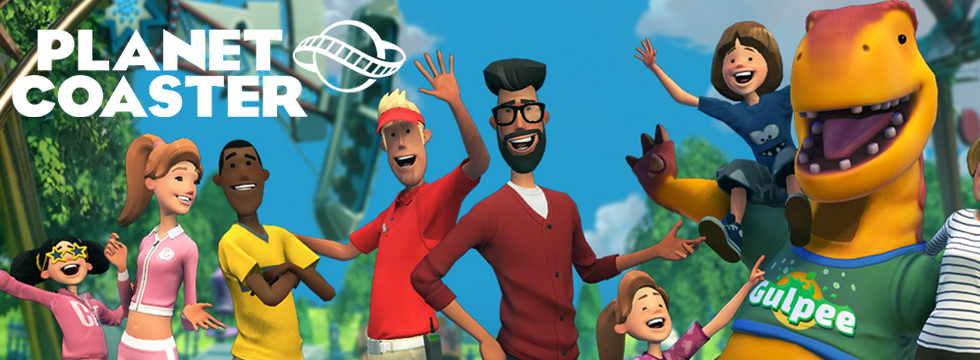
- That’s how you revive a classic – respectfully, but with a slew of new ideas;
- Detailed, cute graphics with a Pixar vibe;
- A real sandbox – imagination is the only limit;
- Intuitive interface;
- Plenty of options and approachable coaster design;
- Mod support (thousands are available already);
- For the genre aficionados – an absolute must-have.
- The audio is all right, but it gets boring fast;
- The economy system has some potential, but it’s too shallow;
- Sometimes meticulously designed roller coasters are ignored by AI.
How to sum up the clash between Planet Coaster and RollerCoaster Tycoon World? I guess “opposites attract” sounds about right. I can’t remember the last time when two so very different games of the same genre debuted in such short time span. They’re both amusement park tycoons, but while the latter turns out to be more of a tycoon horror story, the former manages to come out on top. Planet Coaster is a great game, in which excitement only wanes to make room for a feeling of accomplishment – just like on a good roller coaster.
There is a town called Sevres in France, in which one can find, besides many fine artifacts of ages-old porcelain, the metrological standards – or etalons – for one meter and one kilogram. If we’d ever be unlucky enough to perish in some sort of an apocalyptic event, someday some intelligent creature will grab the platinum-iridium cylinder, and utter an exclamation along the lines of “so that’s one kilogram!”. But where am I even going with this digression... The point is that the International Bureau of Weights and Measures in Sevres should urgently obtain a copy of Planet Coaster, and accept it as an International Video Game Remaster Prototype. On the one hand, the developers approached the original concept with great respect, on the other, they weren’t afraid to introduce lots of new solutions and technical improvements. Frontier Developments have made a perfect roller coaster tycoon, which – although it has its shortcomings – can impress us with the level of polish, graphics, and the associated modding scene.
Let’s set up the toys
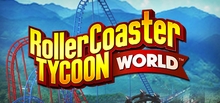
RollerCoaster Tycoon World is a game created by Atari. In the abstract, the game was supposed to compete with Planet Coaster for the title of the king of coaster sims. However, the reality revised that claim quite harshly – RollerCoaster Tycoon World was a game full of mistakes and a general disappointment – only 31% of positive reviews on Steam places this title right next to the newly “appointed” greatest let-down of all time – No Man’s Sky.
Fasten your seatbelts, and double check if the doors of your carts are closed – we’re about to get moving. Planet Coaster offers three game modes. The first one is Career, which, at its core, is basically a lengthy tutorial. It’s divided into four parts; in each of them, the parks have different themes – we set off with The Pirates of the Caribbean sort of thing, and end up with a blackish monolith straight from Kubrick’s 2001: A Space Odyssey. We manage pre-defined parks in new environments and try to fulfill the tasks given to be awarded three stars at the end of a scenario. These objectives are cleverly designed and allow us to learn all the subsequent elements of the mechanics gradually. Even though you can spend over a dozen hours in the tutorial alone, the fun is only beginning here.
The train is climbing towards the top of the incline to rapidly push you into your seat the next second – we’re hurtling down! The second mode is Challenge, or the type of game mode where you begin on an empty map (there are five biomes to chose from, such as mountains or desert) with a certain amount of cash and only one objective – to create the greatest amusement park ever known to man. On our way to the top of the roller coaster business, we discover new cosmetic elements, new carousels, and new challenges every now and then. This mode brings to mind a classic economic strategy – the number of income charts, methods of advertising, or possible ways of paying loans will make every fan of figuring out numbers and “Excel tables“ giggle with excitement. Let’s just say that the people visiting the park are described by six different statistics, such as hunger, entertainment, or... the need (more or less immediate) to visit a restroom. Too bad that this mode, albeit pretty complex, doesn’t pose a real challenge – making money is easy, and hectic crowds of people come by the thousands anyway. You can leave the game for fifteen minutes unattended and nothing will stop working.
Low difficulty level isn’t anything new to the series, and many players won’t even consider it a disadvantage, but I personally regret that among the many fresh additions the developers didn’t include a more challenging economy. However, this decision becomes more understandable as we get to the third game mode: the free mode. Here, the money is virtually unlimited, and the only goal is to create amusement parks for your creative pleasure, and to the delight of other Steam Workshop users – if only you share the fruits of your labor with them. Now, everyone is obviously entitled to play and enjoy their favorite game mode, but the developers aimed at creating a game that unlocks its fullest potential in the limitless sandbox. And they certainly achieved that – the players have already shared tens of thousands (!) of works. Anything from simple buildings, through spectacular roller coasters, to entire parks polished in every aspect. For the enthusiasts of sandboxes without all the unnecessary limitations, Planet Coaster hits the right spot.
Masters of the frontier

Planet Coaster has been developed by the British studio Frontier Developments – one with substantial roller coaster heritage. They opened the gates of their amusement park for the first time by developing expansions to RollerCoaster Tycoon 2, and then also created the third (and the first one in 3D) installment in the series. Then, the British studio kept on collecting experience with the development of games like Coaster Crazy for mobile platforms, or the space sim, Elite: Dangerous, to finally release their magnum opus – Planet Coaster.
My little Westworld
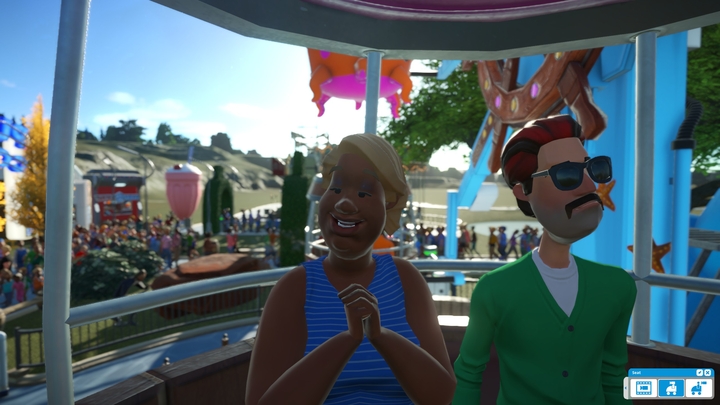
The parks in Planet Coaster are themed – the themes include a medieval-fairy-tale one, with witches, knights and dragons, a science-fiction one, with space invaders shooting laser guns at space marines, or a western setting, in which you can create your own Westworld, just less gritty than its HBO counterpart. Of course, nothing prevents us from combining these themes, and placing a lake with pirates, treasure and corsairs on one end of an alley, and knights charging on a dragon on the other – Planet Coaster is pure sandbox and the only person deciding where to place the assets is you.
What I found incredibly impressive about Planet Coaster is the level of polish of these assets (animatronics, lamps, skulls, barrels, etc). Even the minutest details look very well from up close. What’s more, the terrain manipulation is completely unrestrained and easy to apply. There’s nothing preventing us from using pre-defined layouts and buildings, but it’s also possible to create them from scratch – for example stylize a burger booth as a medieval turret – and then save them as templates and use in a different park or share in the Workshop. A functional interface makes things a whole lot easier here.
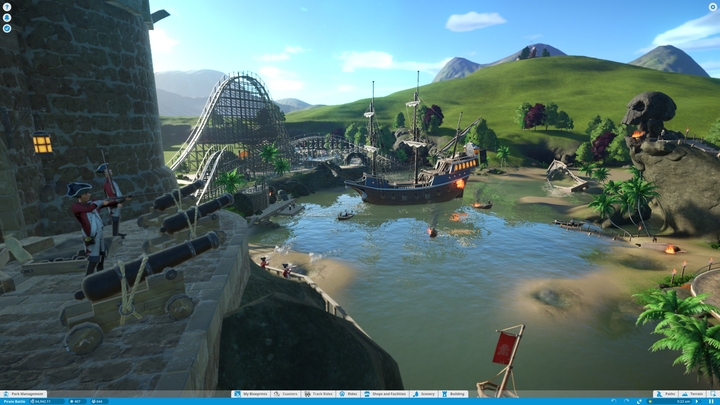
The amount of details and possibilities is on par with the overall quality. The developers managed to make a strategic game that, much like Cities: Skylines, looks great both when zoomed in and out. At any time, you can switch to first person perspective to see for yourself how your rollercoaster works, and how good all the textures are – I actually did it whenever I could, because the thrill of riding your own track is something quite extraordinary. The one reservation I had was that sometimes, after investing some time in tedious design, the visitors completely ignore your new track, because they’re simply not interested in it – which again proves that the economic system isn’t the game’s highlight.
A true sandbox
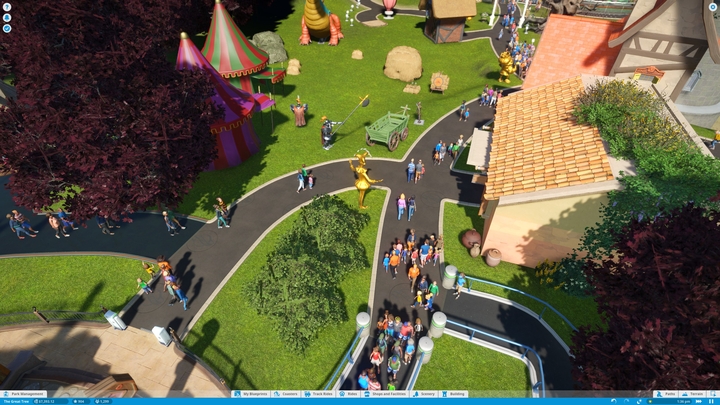
Planet Coaster is all about sandbox – the fact is best asserted by the system for designing the coasters (hold tight, because there’ll be some numbers involved). For starters, there are six types of tracks, as well as a couple dozen templates of loops and arches. If you care about the details and feel inclined to make small tweaks, you can design everything yourself – I mean everything; the length, height, and angles of turns of the track included. If we think the coaster is ready, we have to test it, hence learning the exact statistics such as length, average speed, and freefall time – there’s 14 of those in total. The whole system is still very intuitive and easy to learn; you don’t really need any hints, even at the beginning (though they’re helpful when learning the game’s intricacies).
The number of details you must take into consideration can at times be scary. Each building and each monument can be lit up in different colors from different angles. You can play with hues and the vibrancy for hours, trying to light the park the way you want it – and the final effect can be really impressive, if only you have a soul of an artist. That’s just an example, too – you can play with water effects, smoke, fire and sounds as well. Here, I resorted to the pre-defined templates, only sometimes introducing minor changes myself, but the game handled it perfectly – the templates are all greatly designed, and should you become bored of them, there are thousands more waiting in the Steam Workshop.
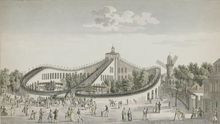
The concept of rollercoasters dates back to the 1600s, and the first people to construct something resembling a coaster were the Russians, who constructed the so-called “Russian Mountains”, bringing to mind contemporary bobsleigh tracks. The biggest rollercoaster today is 136 meters tall, and can get you going as fast as 206 km/h.
As I mentioned earlier, the greatest disadvantage of this game is its economy system, the potential of which has not been fully realized. There are other elements that could also use some upgrades – when the day-night cycle is acting up, the day turns into night immediately, which looks totally odd. The sound design, even though it’s generally solid and quite enjoyable (I totally dig the main theme), can become tiresome at some point. Luckily for us, we can change that by adding our own tunes. The devs could also do a better job with micromanagement. For instance, the prices in shops and carousels are determined separately, which is highly impractical in bigger parks.
The last thing that I noticed and thought was worth discussing was the fact that no-one gets hurt in Planet Coaster. I’m not a sadist type, but the accidents in RollerCoaster Tycoons introduced some variety into the economy system and were genuinely fun to watch (you could even read about them in in-game newspapers afterwards). The accidents also posed one heck of a challenge in terms of money – their lack is the final proof of Planet Coaster’s simplicity in terms of economy mechanics.
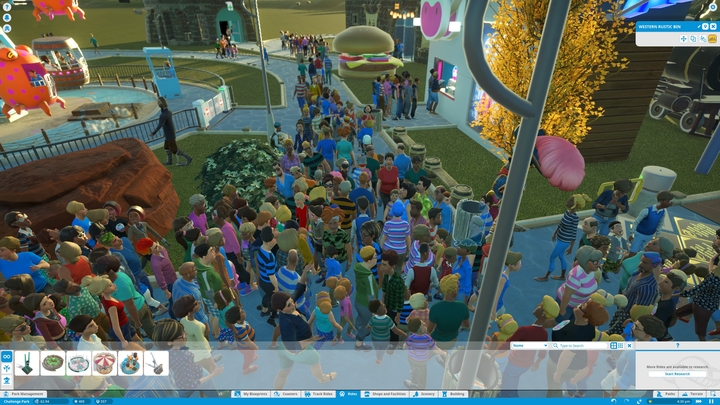
Not for everyone; perfect for some
The abovementioned shortcomings are merely a minor scratch on this otherwise fine gem of a coaster tycoon – sure, it’d be much better off without them, but they don’t spoil the fun. What’s more, most of these flaws will sooner or later be eliminated by the players, who will create mods and overhaul the game. If you have a knack for design and architecture, and if creating amusement parks in which every blade of grass, every lamp or sign can be set up manually sounds intriguing – don’t wait any longer. Planet Coaster is one of the best games in the genre. A fair warning for the fans of proper economic strategies, in which bad decisions are costly – turn your attention elsewhere, for there’s nothing for you here.
Planet Coaster not only matches the old classics – it actually manages to surpass them on many levels. And that shouldn’t come as a surprise. After all, contemporary coasters are much faster and safer than those from years back. This is how technological progress works – the devs from Frontier Developments got it right and created a great amusement park sandbox.
Planet Coaster
Planet Coaster review – perfect sandbox, imperfect strategy
Planet Coaster is a great come-back of roller coaster tycoons. The game gives the fans everything they expected, and though the economy system could be more demanding, the production as a whole is an outstanding sandbox.

